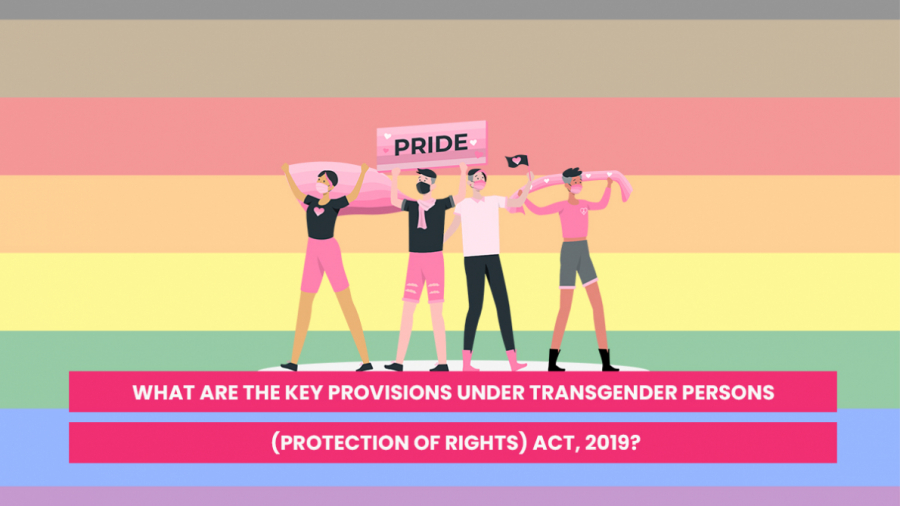The Transgender Persons (Protection of Rights) Act, 2019 (Act) received the presidential assent on 5 December 2019. The Act subsequently came into effect on 10 January 2020, by way of a notification published in the Official Gazette.
Key Definitions
- Person with Intersex Variations: This is defined as a person who at birth shows variation in his or her primary sexual characteristics, external genitalia, chromosomes or hormones from normative standard of male or female body.
- Transgender Persons: The Act defines a transgender person as one whose gender does not match the gender assigned at birth. It includes trans-men and trans-women (whether or not such persons have undergone sex reassignment surgery or hormone therapy or laser therapy or such other therapy), persons with intersex variations, gender-queers, and persons having socio-cultural identities, such as kinnar, hijra, aravani and jogta.
Prohibition against Discrimination
The Act prohibits discrimination against a transgender person (by any person or establishment) on grounds including, denial or discontinuation of or unfair treatment or termination in: (i) educational establishments and services; (ii) employment or occupation; (iii) healthcare services; (iv) access to, or provision, or enjoyment, or use of goods, accommodation, service, facility, benefit, privilege or opportunity available to the public; (v) right to movement; (vi) right to reside, purchase, rent, or otherwise occupy property; (vii) opportunity to stand for or hold public or private office; and (viii) government or private establishment in whose care or custody a transgender person may be.
Recognition and Certification
A transgender person has a right to be recognized as such, and a right to a self-perceived gender identity. An application can be made to the District Magistrate for a certificate of identity as a transgender person. In case of a minor child, such application can only be made by a parent or guardian. The gender of the transgender person, as recorded in the certificate, will be recognized and recorded in all official documents. This certificate of identity entitles the concerned persons to change their first name in birth certificates and all other documents relating to their identity. A revised certificate may be obtained if the individual undergoes surgery to change their gender either as a male or a female.
Duties of Family: Right of Residence
Every transgender person shall have a right to reside, be included and enjoy and use the facilities in the household where parent or immediate family members reside. A child cannot be separated from parents or family members on account of being a transgender, except if court has passed an order otherwise in the interest of the child. If parent or immediate family is unable to care for the transgender person, the person may be placed in a rehabilitation centre, on the orders of a competent court.
Duties of Educational Institutions
An educational institution (funded or recognised by the government) is required to provide inclusive education and opportunities for sports, recreation, and leisure activities, without any discrimination. For the purposes of the Act, ‘inclusive education’ means a system of education wherein a transgender students learn together with other students without fear of discrimination, neglect, harassment or intimidation and the system of teaching and learning is suitably adapted to meet the learning needs of such students.
Obligations on the Government
- The Act states that the relevant government will take measures to ensure the full inclusion and participation of transgender persons in society. It must also take steps for their rescue, protection and rehabilitation; formulate schemes that are transgender sensitive, non-stigmatising and non-discriminatory; formulate welfare schemes and programmes to facilitate and support livelihood including vocational training and self-employment; promote their participation in cultural and recreational activities; and take such welfare measures as may be prescribed to protect the rights and interests of transgender persons, and to facilitate their access to such welfare schemes.
- Healthcare: The government must take measures to provide healthcare facilities to transgender persons, including (i) setting up separate HIV Sero-surveillance centres; (ii) providing medical care facility and counselling for sex reassignment surgeries, hormonal therapy, etc.; (iii) bringing out a health manual related to sex reassignment surgery in accordance with the guidelines issued by World Profession Association; (iv) reviewing the medical curriculum and research for doctors to address health issues of transgender persons; and (v) provide comprehensive medical insurance schemes for sex reassignment surgery, hormonal therapy, laser therapy or any other health issues.
- National Council for Transgender persons (NCT): The central government is required to constitute an NCT – this has been constituted already vide notification dated 21 August 2020. NCT’s function is to advise the central government, monitor the impact of policies, legislation and projects with respect to transgender persons and review and coordinate the activities of all government departments and NGOs. It will also redress the grievances of transgender person and perform such other functions as may be prescribed.
Obligations on Establishments (Private and/or Government)
- Employment: No discrimination in any matter relating to employment, including recruitment, promotion and other related issues. The Act also provides that all establishments are required to comply with the provisions of the Act provide the prescribed facilities.
- Complaint Officer: Every establishment is required to designate a person to be a complaint officer to deal with complaints in relation to violation of the provisions of the Act.
Offences and Penalties
The Act recognizes the following offences against transgender persons: (i) forced or bonded labour (excluding compulsory government service for public purposes), (ii) denial of the transgender person’s right of passage to a public places or obstruction in access to public places, (iii) removal from household, village or other place of residence, and (iv) physical, sexual, verbal, emotional or economic abuse. The penalty is imprisonment for a term varying between 6 months and 2 years and fine.
– Written by Aakriti Chokhani
 Cart is empty
Cart is empty 

